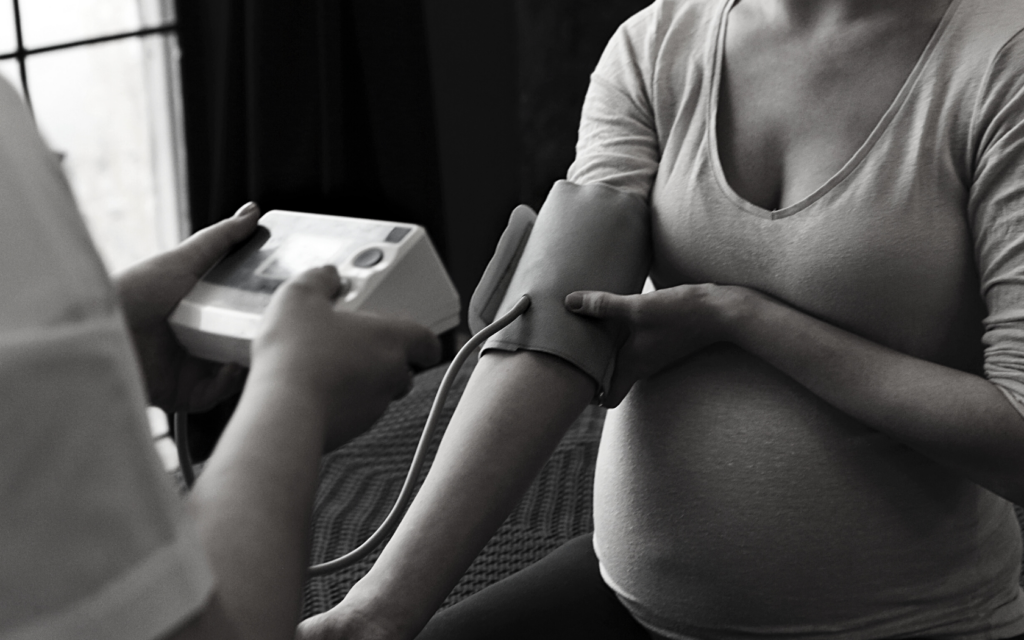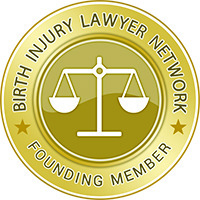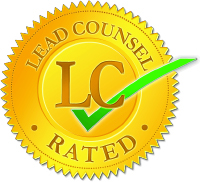Babies born to mothers with preeclampsia can suffer severe complications. Those complications can even be fatal when doctors don’t diagnose and treat them in time. In this article, we’ll dive into what preeclampsia is, and how preeclampsia affects the baby.

What is Preeclampsia? High Blood Pressure?
Preeclampsia is a high blood pressure condition that affects about 3% to 7% of all pregnant women. It’s characterized by elevated blood pressure, proteinuria (high levels of protein in urine), and/or signs of organ damage. The most common time for it to occur is after week 20 of the pregnancy.
Also, there’s a connection between preeclampsia and cardiovascular disease (and kidney disease). Women who have chronic kidney disease, chronic high blood pressure (chronic hypertension), or another preexisting cardiovascular disease have a higher risk of developing preeclampsia during pregnancy.
Women who’ve had preeclampsia in a previous pregnancy have a significantly higher risk of developing the condition in later pregnancies. The symptoms of preeclampsia can be slow or fast to develop. And they vary from person to person, ranging from mild preeclampsia symptoms to severe.
Preeclampsia symptoms can include:
- A sudden spike in blood pressure
- Headaches
- Excess protein in urine
- Nausea
- Vomiting
- Swelling (especially in the face, hands, and feet)
- Breathing issues (like shortness of breath)
- Sudden weight gain (ex. 2-5 pounds in one week)
- Vision changes (blurry vision, temporary vision loss)
- Elevated liver enzymes
Doctors need to diagnose and treat preeclampsia as soon as possible. Although some of its symptoms might seem benign, it’s a serious pregnancy complication that can lead to injury or even death for both mother and baby.
How Does Preeclampsia Affect the Baby? Severe Preeclampsia?
High blood pressure can reduce the amount of blood that reaches the baby through the placenta. Less blood equals less oxygen and nutrients. Those are two vital elements that a baby needs to live.
What happens when a baby receives too little oxygen and nutrients? If oxygen deprivation is severe, there’s a high risk of brain damage. Oxygen deprivation that continues for too long can be fatal.
Two main factors influence how preeclampsia affects a baby:
- Gestational age
- The severity of hypertension (high blood pressure)
We can also factor in the actions of medical personnel. When doctors treat preeclampsia as soon as they’re aware of it, babies often make full recoveries. If not, preeclampsia can lead to reduced blood flow to the placenta, resulting in fetal growth restriction and worse.
In a best-case scenario, a doctor would listen to a mother when she complains about her symptoms. They would watch for signs of preeclampsia. They should also monitor the woman’s blood pressure, especially if she’s at high risk for developing the condition. Failing to do this and failing to consider all risk factors can lead to severe birth injuries. In that case, parents may have the right to sue for medical negligence.
Complications of Preeclampsia in Babies
With timely treatment, the outcome can be good for babies born to mothers with preeclampsia. But untreated preeclampsia can lead to short-term and long-term effects, like:
Changes in Fetal Growth
A lack of nutrients stunts growth. This can put the baby at higher risk for developing conditions like diabetes and hypertension later in life. Severe growth impediments can also cause fetal death.
Premature Birth
In severe cases of preeclampsia, it may be necessary to deliver early to protect both the mother and the baby.
Respiratory Distress Syndrome
Babies born prematurely or with low birth weight due to preeclampsia may not have fully developed lungs. They can suffer from respiratory distress syndrome, a condition in which the baby has difficulty breathing.
Brain Injuries
Preeclampsia can cause hypoxic-ischemic encephalopathy (HIE). This is a brain injury that develops when a baby doesn’t get enough oxygen. HIE can lead to cerebral palsy, a muscle movement disorder.
Stillbirth
Stillbirth is the term for a baby that dies in utero before or during delivery. It’s rare, but babies have passed away from undiagnosed preeclampsia because doctors ignored the signs.
Hypertension in Pregnancy & Neurodevelopmental Disorders
A study published in JAMA Psychiatry examined the link between preeclampsia and neurodevelopmental disorders in babies.
The study showed that preeclampsia in term pregnancies was associated with an increased risk of:
- Cerebral palsy
- Autism
- Attention deficit/hyperactivity disorder
- Epilepsy
- Intellectual disability in offspring
Here’s why preeclampsia and these disorders are connected. First, preeclampsia alters blood flow to a baby’s brain and neuronal connectivity. Those changes can lead to neurodevelopmental problems.
Second, the usual treatment for preeclampsia is to deliver the baby. That means the baby might be preterm. Preterm birth harms neurodevelopment.
But babies born to mothers with preeclampsia don’t have to be born preterm to develop neurodevelopmental disorders. The study examined only babies born full-term. So a change in blood flow to the brain can be enough to put a baby at risk.

Who is Liable When Preeclampsia Affects the Baby?
Sometimes, preeclampsia affects a baby despite a doctor’s best efforts. Other times, negligence is to blame. When that’s the case, parents have the right to take legal action.
Different parties could be liable when a baby is injured from preeclampsia complications:
- The doctor who attended the birth didn’t order a C-section in time to save the baby’s life
- A gynecologist who ignored a mother’s symptoms or failed to notice the risk factors
- Hospital personnel who mixed up medicine or misread test results
Babies born to mothers with preeclampsia deserve a fair chance at life. If your child was injured because of negligence, don’t stay quiet. We can make sure negligent healthcare workers hear your voice loud and clear. Contact us to learn more about filing a birth injury lawsuit to obtain compensation.












